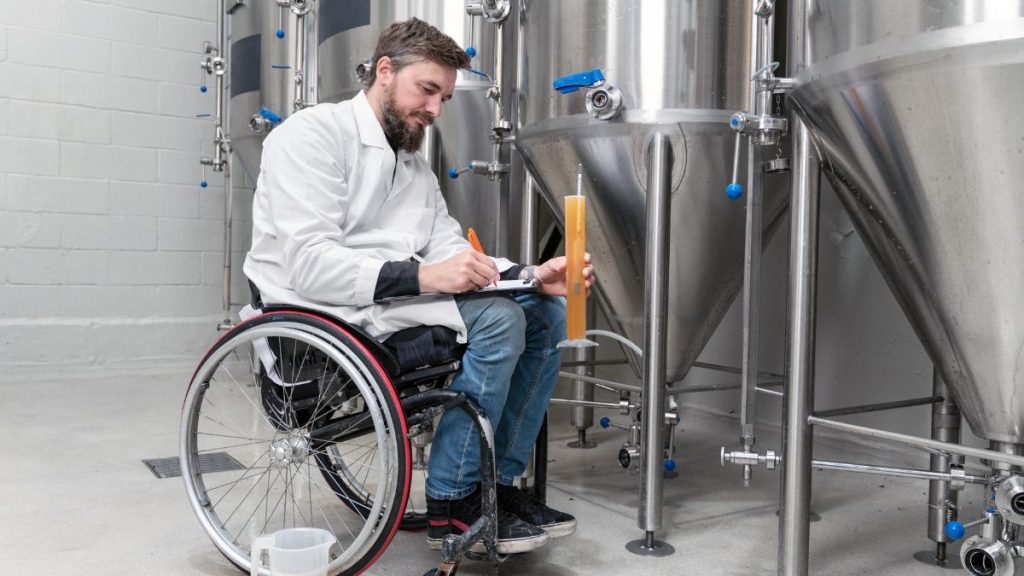Are you passionate about STEM (Science, Technology, Engineering, and Mathematics) but wondering how to navigate a career path with a disability? You’re in the right place. With the right support and resources, you can achieve your dreams in the STEM field. Here’s a guide to help you explore exciting career options and discover the support available to make your aspirations a reality.
Electrical Design Engineer
What’s the job?
Imagine designing cutting-edge electrical systems that power our world. As an Electrical Design Engineer, you’ll develop and improve electrical systems across various industries. You’ll use digital tools to create innovative solutions and often work in engineering firms or manufacturing settings.
How can it accomodate?
This role often involves working with digital tools and software, which can be done remotely or in an accessible office environment. Adaptive technology can support tasks such as design work and system analysis, allowing flexibility in work locations and schedules.
What do I need?
To pursue this career, you’ll typically need a bachelor’s degree in Electrical Engineering (Honours) or a related field. Familiarity with design software like AutoCAD and strong analytical skills are also essential skills.
Signal Engineer
What’s the job?
In this role, you’ll be involved in managing and fixing traffic signals, planning budgets, and conducting feasibility studies. If you have a knack for problem-solving and enjoy working with technology, this could be a perfect fit. You’ll need a background in electrical or computer engineering and programming skills.
How can it accomodate?
Signal Engineers handle a range of tasks from planning to administration, which can often be performed from a desk or office setting. Assistive technology like screen readers or speech-to-text software can aid in managing signal systems and communication.
What do I need?
A bachelor’s degree in Electrical Engineering (Honours), Computer Engineering (Honours), or Physics is usually required. Programming skills, particularly in languages like C++, are also really valuable.
Railway Signal Engineer
What’s the job?
If railways fascinate you, consider becoming a Railway Signal Engineer. This role involves maintaining and developing railway signalling systems. You’ll need qualifications in electrical, electronic, or computer systems, and some positions offer office-based work or opportunities in workshops.
How can it accomodate?
While some roles might involve fieldwork, many tasks such as system programming and monitoring can be done from an office or control room. Employers can provide ergonomic workstations and adaptive equipment to support your needs.
What do I need?
You’ll need a degree in Electrical Engineering (Honours), Electronic Engineering (Honours), or Computer Science. Additional qualifications in Software Engineering or Information Technology can also be beneficial.
Estimator
What’s the job?
As an Estimator, you’ll determine costs for electrical projects ranging from industrial to commercial scales. In the electrical field, an Estimator typically works in an office environment, where they prepare cost estimates for electrical projects. They analyse blueprints, specifications, and other documentation to assess the cost of materials, labor, and equipment required for a project.
How can it accomodate?
Estimators often work from a computer, preparing cost estimates and analysing project requirements. Work can be performed remotely or in an accessible office environment, and adaptive technologies can assist with calculations and data management.
What do I need?
It’s common for Estimators to start their careers as electricians or in a related technical trade. Completing an apprenticeship leading to a Certificate III in Electrotechnology Electrician (or a similar qualification) is a typical pathway. Practical experience in the electrical field, often gained through working as an electrician, can also help with understanding the complexities of project costs.
Some Estimators may pursue further education, such as a diploma or advanced diploma in Building and Construction (Estimating) to enhance their expertise and career prospects.
Project Manager (Electrical)
What’s the job?
Oversee large electrical projects, manage budgets, and lead teams as a Project Manager. You’ll ensure projects are completed smoothly and on time.
How can it accomodate?
Project Managers oversee large projects and often have the flexibility to work from an office or home. Assistive technologies can help with project management software, scheduling, and communication tasks, making it easier to handle responsibilities.
What do I need?
You’ll need a degree in Electrical Engineering (Honours) and experience in the field. Other pathways include getting a bachelor’s degree in Business Management or Economics, then going on to pursue a Master of Business Administration.
Electronic Bench Technician
What’s the job?
in this role you’ll test, program, and service electronic devices in various settings, from workshops to remote support. With flexibility in where you work, you can find a role that suits your access needs.
How can it accomodate?
This role involves testing and repairing electronic items, which can often be performed in a workshop with adjustable workstations. Equipment can be modified to suit physical needs, and tasks can be adapted to fit individual abilities.
What do I need?
Typically, you’ll need a Certificate III in Electronics and Communications. Hands-on experience in troubleshooting and servicing electronic equipment is also great if you want to get into this kind of career.
Electric Motor Winder
What’s the job?
Work on repairing and maintaining electric motors and related equipment. This is a very hands-on job, perfect for Makers, and mainly offers opportunities in workshop settings.
How can it accomodate?
Working in a workshop setting, this role involves assembling and repairing electric motors. Workstations can be designed for accessibility, and tasks can be adjusted to accommodate limitations if needed.
What do I need?
A Certificate III in Electrical Machine Repair or a higher qualification is required if you want to go for this job.
PLC (Programmable Logic Controller) Programmer
What’s the job?
As a PLC programmer, you’ll be writing programs for industrial devices and automation systems. PLC programmers work with PLCs, which are specialised computers used to automate industrial processes such as assembly lines, robotic devices, and manufacturing operations
How can it accomodate?
PLC Programmers write code for automation systems, typically working from a computer. This role can be performed remotely or in an accessible environment, with software and tools able to be tailored to individual needs.
What do I need?
A Certificate IV in Industrial Automation and Control is a good starting point. You’ll also need to learn specific PLC programming languages like Ladder Logic and Structured Text.
Building Automation Controller
What’s the job?
If you do work as a Building Automation Controller, you’ll be responsible for managing Building Automation Systems (BAS) which are designed to control a building’s climate and lighting. In this job you could be monitoring the system’s performance, programming them, checking for faults and reporting them, and carrying out routine maintenance and updates.
How can it accomodate?
This role involves managing building systems like climate control and lighting, so you’ll often work from a control room, office, or even sometimes from home. Adaptive technologies can assist with system monitoring and troubleshooting, ensuring tasks are manageable.
What do I need?
A bachelor’s degree in in Electrical Engineering (Honours), Information Technology, or a related field is essential. Familiarity with BAS programming and routine maintenance procedures is also required.
Find the right resources
Whether you’re ready to dive into a STEM career or still exploring your options, there are numerous resources available to help you succeed. Here are some useful starting points for students, parents, and career advisors:
- Queensland Education – Senior Pathways Planning: Explore career pathways
- NSW Education – Disability Learning and Support: Find support and resources
- ACT Education – Support for Students with Disabilities: Access helpful information
- Victoria Education – Additional Needs and Leaving School: Get guidance on school transitions
- South Australia Education – Disability Support: Explore support services
- Western Australia Disability Support: Learn about available assistance
- Northern Territory Special Education: Find out about special education services
- Tasmania Support for Students with Disabilities: Access support information
- Australian Disability Employment Services: Explore employment resources
- National Disability Services – Transition to Employment: Find tools for transitioning to work
- My Milestones – Transitioning from Study to Work: Get tips for the transition
- Australian Network on Disability: Access support services
- Challenge Community Services – Life After School: Read about planning for life after school
Stay inspired
If you’re thinking about university or other educational opportunities, consider these additional resources:
- University disability services
- Scholarships for students with disabilities
- Understanding special consideration
- Finding work experience for students with a disability
- YDAS Young Leaders program
STEM unlocked
Remember, the best source of information is to speak to organisations directly. If you’re thinking about a career, apprenticeship or tertiary studies, reach out and ask about what’s possible and what opportunities might be open to you. By exploring these options and using available resources, you can find a career path that matches you and supports you.
Want more? Check out our website for more articles and resources here.


